Norbert Girard, you head up the Observatoire de l'Évolution des Métiers de l'Assurance. In a few words, what are your roles and missions?
The Observatory, which is 20 years old this year, is an association whose purpose is to help identify the factors that are likely to affect the insurance industry and, in particular, the consequences for qualifications and training needs.
To achieve this, the Observatory conducts surveys and uses social databases on the state of the profession's human resources. The aim is to gain a better understanding of :
- companies' needs in terms of skills and training
- the economic and organisational factors likely to influence these needs
- human resources management practices
In practice, we are a small team of four people who produce all our studies ourselves, without any outside help. We operate rather like a research lab, making our studies available to insurance companies, employers' and employees' organisations, and professional bodies involved in employment, training and education. In fact, all our work is freely available for consultation on our website: www.metiers-assurance.org
Lig Data will lead insurers to review their policyholder relations and risk management policies: are they all ready to adapt to these new challenges?
Technological developments in data collection and processing point to future breakthroughs in risk selection and pricing, customer segmentation and customer relationship management. But there is a long way to go from accumulating new data to transforming it into additional operational knowledge about customers... and an even longer way to translate and integrate it into business processes.
While tomorrow's insurance implies moving from an event-based approach to a behavioural, usage-based approach, we must not forget the very foundation of our insurance business: the pooling of risks... which is not incompatible with greater personalisation of the services - insurance and/or other - offered to our customers. In other words, even if there are many changes to come, they will be implemented progressively and successively, based more on Smart Data. With the 'how' taking precedence over the 'what', the challenge of transformation lies above all in the appropriation of the new tools by the players themselves. This is the main reason why I don't believe in a Big Bang for Big Data...
Another revolution is on the horizon, that of blockchain: even if no-one fully understands what is at stake, here again, many changes are to be expected...
Unlike other subjects where you need to have invested in order to offer a credible opinion, blockchain has the advantage that there are almost as many different opinions as there are discussants. It has to be said that the subject (which is very much in vogue) is relatively recent, in terms of our sector of activity, and that there is a singular lack of experts capable of making the link with the particularities of our inverted production cycle. This technology, and above all its possible effects, are therefore very much on our radar screen, but I have to admit that we're waiting for everything to settle down a bit before attempting any forward-looking analysis of its consequences in terms of job content...
Another challenge, and not the least, is the integration of young people, and the future Generation Z after Generation Y: how do you deal with these generational upheavals?
What is at stake is no longer simply the transmission of knowledge and skills acquired through long years of hard work on the job (sic). The main feature of this revolution undoubtedly stems from the fact that age and experience are no longer the exclusive guarantee, or even the symbol, of efficiency in the workplace (any more than age is an absolute guarantee of wisdom). The world we have come to know and understand is undergoing profound reinvention: tools are changing, work environments are being redesigned, ways of working are mutating...
This is undoubtedly where the break between the old and new worlds lies (and where actions of the reverse mentoringfor example, aim to respond). That's why these different approaches to efficiency are destabilising for managers and employees alike, for the granddaddy boomers and generation X... but just as much for generation Y, who had to learn the Internet, as for generation Z, born with a smartphone in the palm of their hand and yet unaware of our corporate culture!





